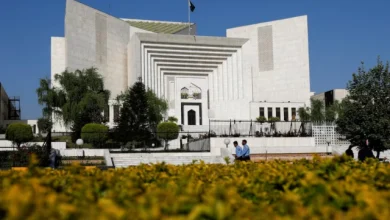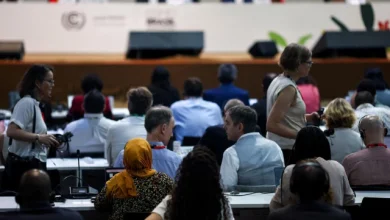Govt convenes NFC meeting on Dec 4

Federal Minister for Finance and Revenue Muhammad Aurangzeb. PHOTO: APP
ISLAMABAD:
Khyber-Pakhtunkhwa (K-P) Chief Minister Sohail Afridi has announced attending the maiden meeting of the National Finance Commission (NFC) but demanded that the Centre settle over Rs3 trillion outstanding liabilities and also honour its commitment to construct an irrigation canal.
“I will attend the NFC meeting as it is a matter of the provincial fiscal rights,” said Afridi while talking to journalists in Islamabad on Friday.
The federal government has convened the maiden meeting of the NFC on December 4 in Islamabad. This meeting will set the stage for devising a new formula to distribute the fiscal resources between the Centre and the federating units.
In the maiden meeting, the commission will have general discussion on the strategy for deliberations on the 11th NFC award, including proposed formation of sub-groups for deliberations on the thematic areas, according to the agenda of the meeting.
Finance Minister Muhammad Aurangzeb will chair the meeting that will be attended by four provincial finance ministers and their technical members.
The portfolios of finance ministers are held by the K-P CM Afridi and Sindh CM Syed Murad Ali Shah.
The five key stakeholders, Balochistan, Punjab, the K-P, Sindh and the federal government will give presentations on their respective fiscal positions.
The federal government wants to reduce the share of the provinces from the existing 57.5% of the total divisible pool, either by cutting the percentage of revenues or by shifting responsibilities of expenditures, or through a combination of both.
However, the provincial share from the current 57.5% cannot be reduced until the Constitution is amended. Prime Minister Shehbaz Sharif has recently shared his thoughts about reducing the provincial share.
During a high-level meeting, Shehbaz stated that customs duties were not part of the NFC award and should be treated as federal revenue.
However, the 7th NFC, which was finalized and approved in 2009-10 includes the custom duties as part of the federal divisible pool along with income tax, wealth tax, capital value tax, sales tax and federal excise duty.
For the current fiscal year, the provincial governments’ estimated share in federal taxes is Rs8.2 trillion on the basis of projected Rs14.13 trillion tax collection by the Federal Board of Revenue. Out of this sum, Rs892 billion or 10.8% is on account of custom duty.
The K-P chief minister said his province’s share on account of revenue generation, inverse population density and increase in the ratio of the population after the merger of the erstwhile tribal districts should be increased in the next NFC award.
He said the federal government owed Rs3 trillion to the province on account of net hydel profit and pending share under the NFC.
The federal government owed Rs2.2 trillion on account of outstanding dues of net hydel profit and another Rs800 billion are outstanding under the NFC, he said.
The federal government had committed to give Rs700 billion, Rs100 billion per year, in cost to reintegrate and develop the merged districts, said Muzammil Aslam, the finance adviser to the K-P CM. Aslam said so far only Rs165 billion have been given during the past seven years, leaving a gap of Rs535 billion.
The provincial population has increased, which should have increased our share to 19.6% seven years ago but despite that the federal government owe the province Rs700 billion to Rs800 billion, he said.
This year, the provincial share in the NFC based on the revised population is Rs225 billion higher than what it is so far getting, said Aslam.
For this fiscal year, the federal government had committed Rs65 billion for the merged districts but the K-P did not receive a penny during the first five-months of this fiscal year.
The K-P CM also demanded the federal government fulfill its promise of funding the Chashma Right Bank Canal, which, he said, was very critical for the food security of the province. He said the Centre had initially committed to provide 80% funding for the project, which it has now reduced to 65%.
We have set aside 35% of our funding share but the federal government is not fulfilling its commitment, said Afridi.
He said the Punjab government’s decision to ban the transportation of wheat to his province pushed the price of the wheat and bread high and created highly negative sentiments in the province.
The upcoming NFC discussions are based on the notion that the federal fiscal woes are rooted in the 7th NFC, which increased the provincial share by 10%.
However, the 10% increase in the share had to be compensated by a 1% increase in tax-to-GDP ratio every year starting from 2010. In the year 2010, the tax-to-GDP ratio was 10%, which remained glued there.
“Pakistan’s tax-to-GDP remains stubbornly low at around 10% of GDP over the past 5 years,” said the Governance and Corruption Diagnostic Assessment report of the IMF, released on November 9 by the Finance Ministry.
The IMF report underlined that Pakistan’s tax system is also complicated by the lack of harmonization and coordination between federal and provincial taxes.
The lack of harmonization and coordination of the sales tax, with the federal tax on goods and the provincial taxes on services, continues to complicate the tax system, according to the new report.
The IMF said the uncertainty and differences of treatment lead to disputes that may be settled through negotiation with tax officers, providing opportunities for corruption.
It added the National Tax Council continues to work on harmonization with assistance from the World Bank, but progress is slow.
The IMF report underlined that the tax related concerns are exacerbated by the absence of a clear and coherent medium-term strategy for tax policy making. The absence of such a strategy leads to the ad hoc short-term approach to tax policy design.
While the authorities may set a short- or medium-term tax-to-GDP goal, there is no coherent 3-to-5-year tax reform strategy that seeks to meet the usual tax reform objectives of making the system more efficient, equitable, and simpler, while also increasing revenue, said the IMF.
It added that the tax system in Pakistan is excessively complex, which creates uncertainty for taxpayers, invites disputes, enables corruption and compromises economic efficiency and equity.
This complexity leads to uncertainties for taxpayers and the FBR, but also provides opportunities for tax planning and evasion.
“Disputes are often settled through negotiation with FBR officers,” said the IMF. These negotiated settlements increase corruption risks and also lead to potential inequities due to the likely differences in treatment between taxpayers, it added.



